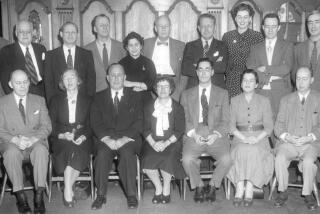Freud in context
To the Editor:
FOR some reason the Los Angeles Times assigned [a review of] my book “Secrets of the Soul: A Social and Cultural History of Psychoanalysis” [July 11] to a historian of 18th century British “lunacy” (Andrew Scull) who has not the slightest feel for such aspects of 20th century Western culture as artistic modernism, the struggle for women’s equality, political radicalism, homosexuality, mass consumption, film, advertising, bohemia, the “new Negro,” the Harlem renaissance, surrealism and the like.
The problem is that these are precisely the worlds in which I situated psychoanalysis. According to Scull, I “let slip” how small the number of analysts were, which to him means they were unimportant.
On the contrary, I show that analysis was a charismatic force whose vast and diverse influence can only be grasped in the broad modernist context, not in the context of psychiatry narrowly conceived.
Eli Zaretsky
Professor of history
New School for Social Research
New York
*
Andrew Scull replies:
Professor Zaretsky doesn’t “show” that psychoanalysis was “a charismatic force” with “a vast and diverse influence”; he asserts it, loudly and repetitively, and on the basis of extremely flimsy and unconvincing evidence. His tendency to leap to unsubstantiated conclusions is neatly in evidence in his letter of complaint, which resorts to an ad hominem (and completely inaccurate) attack on the qualifications of his reviewer.
While it is true that my last two books have dealt with lunacy in 18th century England, my nine books on the history of psychiatry include volumes dealing with both English and American psychiatry from the 19th through the late 20th centuries. I have also published more than 50 scholarly articles on these subjects in a variety of major journals, as Zaretsky could have discovered with a modicum of effort.
As for lacking “the slightest feel” for various aspects of 20th century Western culture, if by that Zaretsky means that I do not find his vulgar and reductionist portrait of “Fordist” and “post-Fordist” capitalism persuasive, I can only plead guilty as charged.
What other basis he can have for such extreme and sweeping claims I do not know, since he is evidently completely unacquainted with anything I have written. In the future, he may be sure that I shall give his writings an equally wide berth.
More to Read
Sign up for our Book Club newsletter
Get the latest news, events and more from the Los Angeles Times Book Club, and help us get L.A. reading and talking.
You may occasionally receive promotional content from the Los Angeles Times.








